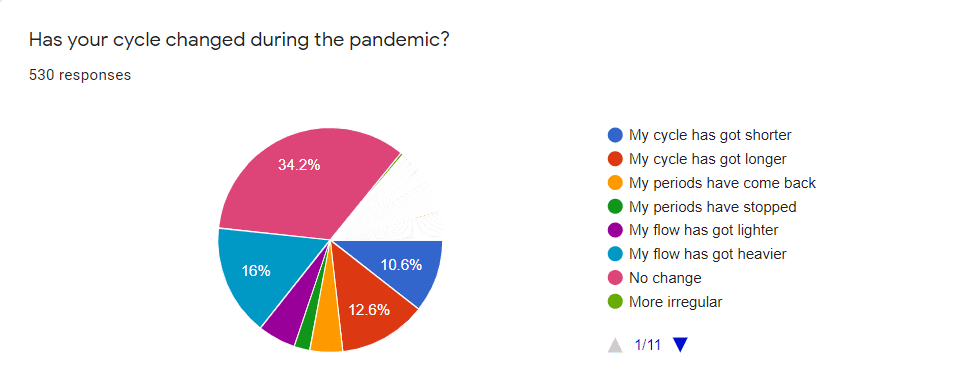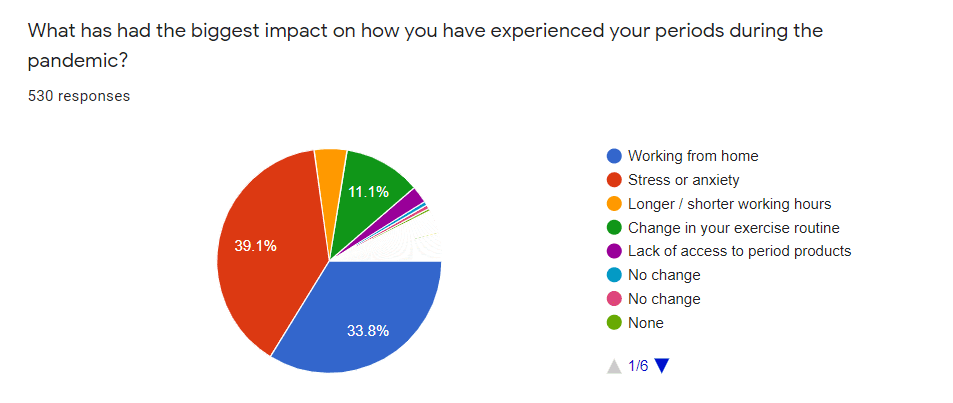



The removal of almost every ounce of structure has led to dramatic changes to our routines – from our work and sleep patterns to what and when we eat, and the amount of exercise we do. These are all external factors that can have a profound effect on our bodies, the menstrual cycle included.
A whopping 79% of the survey participants reported a change in their overall period experience since the start of the pandemic: 42.8% said their experience has been worse and 36.2% better.
The majority of those with a worsened experience put this down to stress and anxiety, from the pressures of home-schooling, redundancies, and business or money worries.

Has your cycle gone up the spout since the pandemic struck? It’s well known that stress can take a toll on your body – and that includes your menstrual cycle.
The pea-sized yet powerful hypothalamus is a part of your brain that regulates bodily rhythms such as sleep, eating, blood pressure, heart rate – and your hormones. It responds to changes in your body’s internal and external environment, as well as stress. So, it’s no wonder that when our normal structure goes to shambles, the whole body reacts.
Only 34.2% of all the survey participants reported no change in their menstrual cycle over the past year. Others told about changes in their menstrual flow (21.5%), cycle length (23.2%), and period regularity. Some said their periods had stopped (2.3%) or come back (4.7%) since the pandemic started.
Stress or anxiety can indeed cause changes to the length of your menstrual cycle, or the heaviness of your flow. Your periods can also become more painful, and in some cases, stress and anxiety can cause you to skip a period or even stop having them completely.

Has your PMS got worse since the beginning of the pandemic? You’re not alone. 45.3% of those who took the survey reported worse PMS symptoms (such as mood swings, bloating, hormonal acne, and irritability) since the Covid-19 upended life as we knew it. Only 10.8% of all survey participants said that their PMS symptoms had improved.
Ongoing stress can up your body’s cortisol levels while upsetting the balance of other hormones. Since symptoms of PMS are thought to be triggered by hormonal changes, it is not surprising that when you’re stressed, your PMS can also flare up.
The survey results clearly show that PMS can have a profound impact on the way we experience our periods, and that stress and anxiety exacerbate this vicious cycle. Among the survey participants whose period experience had got worse since the start of the pandemic, 70% said their PMS had also got worse.

Exercising in lockdown, what of it? Well, if you ask those around you, it seems to have gone either way. Some have found that the general low mood has drained them of all their energy, leaving no motivation for working out. Or you may be so busy juggling “life” that exercise has become a thing of luxury. Others on the other hand seem to have sapped every ounce out of their daily exercise allowance.
The amount of exercise we do, whether very little or a lot, can affect our cycle. From those who took our survey, 11% believed that the change in their exercise routine had had an impact on their period experience.

In healthy doses, exercise has proven to be one of the best ways of relieving some of the symptoms that can accompany periods. Aside from the obvious physical benefits of working out, exercising also helps the blood to circulate in the pelvic area which can reduce menstrual cramps.
That “post-workout high” you get is your body brimming with endorphins, which can reduce PMS pain and boost your overall mood.
But, as with anything, you can have too much of a good thing… Very intense physical activity can act as a stressor, which can in turn affect the hormones responsible for your period, the same way as stress and anxiety can.
If your exercise routine causes your body fat to drop too low, this can stop you from ovulating. If your periods have stopped as a result of too much exercise, it is advised that you reduce your activity.
“Diet? What diet?” you might be thinking. A healthy diet is another thing that may well have gone out the window since the pandemic began. Lack of time, longer working hours, or just the boredom of being stuck at home can make us more prone to reaching for those comfort foods and snacks. On the other hand, stress and anxiety can kill your appetite.
Either way, the food we eat affects our body as a whole. Any change in your diet can have an impact on your hormone balance and can therefore affect your period.
With any diet, a varied, balanced approach is key to ensuring you are getting all the nutrients and minerals your body needs every day of the month. Vitamin B12, omega 3, protein, zinc, iron and more, are all essential nutrients that can affect the menstrual cycle.

Comfort foods and snacks are often high in sugar, saturated fats, refined carbohydrates and additives. They usually lack the vital nutrients the body needs, upsetting your hormonal equilibrium. Too much sugar is also known for hitting your mood and energy.
A dramatic drop in our calorie intake can stop you from ovulating. Similarly, significant weight gain can cause hormonal changes which in turn may alter your menstrual cycle.
So, if you have noticed changes in your menstrual cycle since the pandemic and lockdowns kicked in, you are not alone! Your body may be responding to a whole host of new and complex external and internal changes. However, for peace of mind it’s always a good idea to discuss any concerns with your doctor.

Not everyone’s pandemic period experience has been negative. A significant 36,2% said that their period experience had improved. The main reason for this improvement was working from home.
It’s clear that there is still a taboo to be broken around periods in the workplace. Participants highlighted the shame and secrecy that they still feel around their periods in the work environment. Some also explained that they didn’t feel comfortable asking for time off for reasons relating to their periods or PMS.

Covid-19 restrictions forcing many to work from home has come as a relief for some. The comfort and privacy of home has offered a newly found freedom to look after ourselves on those days when all we really want is a hot water bottle, tracksuit bottoms, and a slower tempo.
But we also heard from those working on the frontline – and how difficult it can be to manage periods on long shifts, and, for some, in full PPE.
When it comes to breaking the period taboo, our work here is not done! There’s an ongoing need in society for period education to address this stigma.

Aside from the amazing people on the frontline and the fabulous key workers, the Covid-19 pandemic has forced a lot of us to press pause on our usual lives.
A whopping 53.4% of the survey respondents had either changed or considered changing their menstrual products since the pandemic began.
The leading drivers for this change were the “comfort of trying something new at home” and “environmental reasons” – each representing 62.5% of the respondents. These were followed by “chance to stop and reconsider your habits” (24.4%), “being more conscious about your health” (22.5%) and “financial reasons” (21.6%).

Could it be that slowing down social activities, cutting out the commute and spending more time between the same four walls has offered many of us an opportunity re-set and re-think? We have more time, and headspace perhaps, to tune into our bodies, and reconsider our priorities, both for ourselves and for our world.
Mooncup has been empowering us to have a choice over our own bodies and periods since 2002. It is the healthier, greener, cheaper alternative to disposable period products. Get yours here.
If you have any questions about the Mooncup, please feel free to contact us, customercare@wearemooncup.com